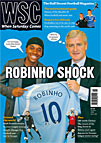 Brazil’s quest for Olympic glory fell short once more, adding to the pressure on Dunga in the World Cup, writes Robert Shaw
Brazil’s quest for Olympic glory fell short once more, adding to the pressure on Dunga in the World Cup, writes Robert Shaw
A new film called 1958 – The Year in Which The World Discovered Brazil has the team fondly recalling how the blue shirts worn to beat Sweden in the World Cup final were hurriedly bought at a local shop. The badge of the football federation was then stitched on. Fifty years on and Brazil’s Olympic team turn up to collect their bronze medals with sticking plasters over offending badges – the full national football team wear Nike shirts, while Olympikus sponsor the Olympic team,
Trivial, perhaps, but a detail reflecting Brazil’s lack of planning for Beijing. After a 3‑0 semi-final defeat by Argentina had ended hopes of improving on the silvers won in 1984 and 1988, national coach Dunga took a hammering in the press. With the senior team currently labouring in the World Cup qualifiers he is now in a weak position; one of his predecessors, Vanderlei Luxemburgo, was unable to overcome personal scandal and defeat by nine-man Cameroon in the Sydney quarter-finals in 2000.
Brazil’s Olympic debacle is reminiscent, too, of the ham-fisted 2006 World Cup campaign, with lightweight preparations, risible friendlies and bizarre selections as common elements. Two years ago, Carlos Alberto Parreira’s conservative instincts were reflected in his choice of ageing or out-of-shape stars. Dunga, however, had made it plain that all his players would have to graft. That idea lasted only until Brazil’s lame 0-0 draw with Argentina in a World Cup qualifier in June. CBF president Ricardo Teixeira then personally selected a patently unfit Ronaldinho for Beijing.
“When we arrived in China I was still not sure who was available,” said Dunga, with Schalke 04 and Werder Bremen contesting the selection of their players, Diego and Rafinha respectively, up to the last minute, while three of the over-age options – Juan, Kaká and Robinho – were vetoed by their clubs. A lack of continuity also meant only two survivors (Lucas and Pato) from last year’s South American Under-20 Championship, which had served as an Olympic qualifying tournament.
This Olympic obsession is fairly new according to Jair Picerni, the coach at the Los Angeles Games: “In 1984 the country didn’t give any importance to Olympic gold. The priority was always the World Cup. But today we are told that a gold medal will be like the eighth wonder of the world.” While the football seems to have caught the imagination of TV bosses and flag-waving commentators, the public seemed more upset about losing the men’s volleyball final.
Dunga criticised the food, climate and training facilities in Beijing, while the players were swept up in a publicity circus, as athletes from other countries competed for Brazilian autographs in the Olympic village. One Swedish woman player even claimed to have received a marriage proposal from Ronaldinho. The verdict on the latter’s performances was damning. Tostão noted in Jornal do Brasil that Ronaldinho “is playing like a veteran at the end of his career. But I don’t think his decline is premature. At 16, at the Under-17 World Championships, Ronaldinho was already a star. He has had ten years of success.”
In yet another reprise of 2006 there was also a falling-out between the coach and the Brazilian media. Dunga argued that he was being unfairly criticised by Brazil’s powerful Globo network because he had stopped unlimited access to the squad. Left-back Marcelinho was generally praised for his performances in China, but the coach has since dropped him from the World Cup squad, in what looks like a self-defeating gesture to spite the media. The press were incredulous that Dunga went on to name nine of the Olympic squad for September’s World Cup games with Chile and Bolivia. His new approach, they argued, is to never change a losing team.
Brazil’s men beat Belgium for bronze but were outshone by an outstanding women’s team. With the extravagantly talented Marta confirming her status as the world’s top player, Germany were crushed 4-1 in the semi-finals. Still they fell short in the final, with an extra-time defeat to a USA side with superior athleticism and stamina. Despite their recent achievements – they were also runners-up at the 2004 Olympics and the 2007 World Cup – Brazil’s women are badly underfunded. Promises of a pro league have yet to be fulfilled and may have to wait until the PR explosion that is bound to accompany Brazil’s build-up to the 2014 World Cup. Goalkeeper Barbara explained: “There is no way to live as a woman footballer in Brazil. We just appear when there’s an event like this. The future is outside the country and I hope that not just me, but that other girls also manage to do something abroad.”
Brazil’s combined Olympics effort yielded three gold medals at a cost of more than £50 million. The prospects of a gold in men’s football joining the five World Cup wins remain remote.
From WSC 260 October 2008